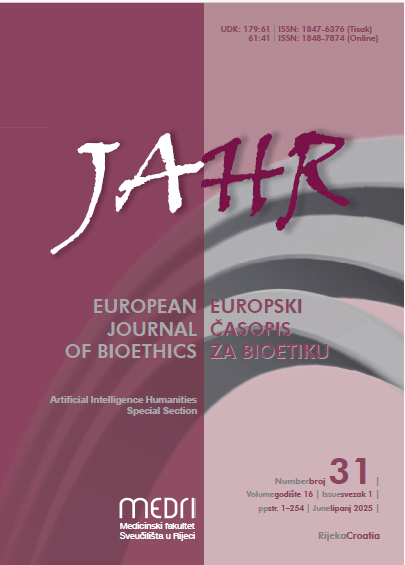Psihoterapijski učinak promjene perspektive
Keywords:
filozofija egzistencije, psihoterapija, slika (svijeta), kognitivna metaforaAbstract
https://doi.org/10.21860/j.16.1.7
Zapadni je čovjek danas postao zarobljenik jedne slike svijeta, jednoga (pre-)uskog (redukcionističkog?) viđenja sebe, svoga života, rada, ciljeva, smisla… Posljedično, čini se da su mnogi današnji čovjekovi psiho(-fizički) problemi uzrokovani upravo time, jer biti zarobljen u jednoj uskoj (npr. strogo materijalističkoj) slici svijeta i sebe lako dovodi do određene dezorijentiranosti, besmisla, nihilizma, izgubljenosti, strahova, bez oslonca i sigurnosti… već u svakodnevnom životu, a osobito kad se susretnemo s težim egzistencijalnim situacijama. Dio tih problema manifestira se na koncu u velikom porastu tzv. „specifično ljudskih bolesti”, kao što su neki karcinomi, ateroskleroza, probavne bolesti i sl. Svega toga je, naravno, bilo i ranije, ali u novije se doba dogodilo naglo povećanje. Posvemašnje odbacivanje naslijeđenih predaja i tradicija jedan je od glavnih uzroka toga, ističe Viktor Frankl, ali i mnogi drugi filozofi, antropolozi i psiholozi. Naime, čovjek je nedovršeno i slobodno biće, pa neprestano mora sam sebe „stvarati”, odnosno oblikovati i osmišljavati. No, s obzirom na gubitak tradicija i jasnih orijentira, to mu odjednom postaje pretežak zadatak u kojem se lako izgubi, a kao posljedica toga nastaju spomenuti problemi. Stoga uvođenje novih, dobro osmišljenih slika i dubinskih koncepata u naše živote često djeluje kao najbolja terapija.
Downloads
Published
Issue
Section
License
Authors who publish with this journal agree to the following terms:
- Authors retain copyright and grant the journal right of first publication with the work simultaneously licensed under a Creative Commons Attribution License that allows others to share the work with an acknowledgement of the work's authorship and initial publication in this journal.
- Authors are able to enter into separate, additional contractual arrangements for the non-exclusive distribution of the journal's published version of the work (e.g., post it to an institutional repository or publish it in a book), with an acknowledgement of its initial publication in this journal.
- Authors are permitted and encouraged to post their work online (e.g., in institutional repositories or on their website) prior to and during the submission process, as it can lead to productive exchanges, as well as earlier and greater citation of published work (See The Effect of Open Access).



